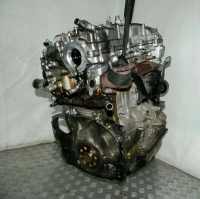 The first generation of the compact crossover was launched in 1994, and the car was aimed primarily at young people for outdoor activities. The second and fourth generation Toyota RAV4s began to be fitted with powerful diesel engines. Totally three models 2AD-FTV, 1CD-FTV and 2,2 2 AD FHV engines were used, which have proved to be the best. The reader is referred to a brief overview of these engines, describing their design, main technical, dynamic and economic characteristics as well as their performance characteristics.
The first generation of the compact crossover was launched in 1994, and the car was aimed primarily at young people for outdoor activities. The second and fourth generation Toyota RAV4s began to be fitted with powerful diesel engines. Totally three models 2AD-FTV, 1CD-FTV and 2,2 2 AD FHV engines were used, which have proved to be the best. The reader is referred to a brief overview of these engines, describing their design, main technical, dynamic and economic characteristics as well as their performance characteristics.
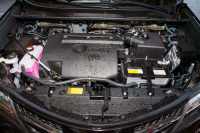
Toyota RAW4 diesel engine range
Toyota has its own design bureau and is involved in the design and production of an extensive range of powertrains. In particular, the company's engineers have developed and put into production a range of engines for the RAV4 crossover:
2AD-FTV another name 2 D4D. Produced from 2002 to 2018, it was the first to feature piezo injectors.
1CD-FTV other name 2.0 D-4D 16v. Launched in 1999 and produced until 2007 with Denso fuel equipment.
2.2 2 AD FHV (2.2 D-CAT). Put into production in 2005 and produced until 2015, complete with Disel Ciean Advanced Technology exhaust aftertreatment system.
The first of these diesels was used in the second-generation RAW4 crossovers, while the second and third were fitted to the fourth generation. Since 2017, sales of cars of this model with 150-horsepower turbodiesels 2AD-FTV with a working volume of 2.2 litres have been resumed in our country.
The 2AD-FTV engine: design, characteristics and operation
Japanese engineers used an aluminium cylinder block with cast-iron liners to lighten the power unit. Open cooling jackets ensured efficient heat dissipation. The cylinder head was also made from aluminium and had two camshafts and 16 valves, which were driven by a chain drive.
The 2.2 D4D diesel fuel system is a Common Rail type with HP3 fuel injection system, manufactured by Denso. Main technical characteristics:
Type and number of cylinders: In-line, four.
The working volume: 2231 cm3.
Piston diameter and stroke: 86*96 mm.
Rated power: 136 to 150 hp.
Torque: 310 to 360 Nm.
Compression ratio: 15.7 to 16.8.
The engine meets environmental standards EURO 4/5 and ensures low fuel consumption (per 100 km of run) for the Toyota RAV4 crossover with automatic transmission:
in the city: up to 8.3 litres;
on a motorway: up to 5,6 litres;
in the mixed cycle: up to 6,5 litres.
The undoubted advantages of the described engine are:
excellent dynamic characteristics;
high reliability of timing chain drive;
efficiency.
The main disadvantages are: weak cylinder head gasket, high oil consumption, frequent failures of EGR valve because of pollution and quick failure of particulate filter.
Diesel 1CD-FTV 2.0: device, main parameters and features
The CD range is the first engine that is equipped with a fuel system of the famous Japanese company Denso (Common Rail type). The basis of the power unit 1CD-FTV is a cast-iron cylinder block, which has no allowance for boring under the repair size. The aluminium cylinder head has 16 valves, adjustable by selecting washers. The two camshafts are rotated by a timing belt, tensioned by a hydraulic mechanism.
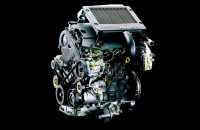
Main technical data 1CD-FTV:
Type: In-line four-cylinder.
Full displacement: 1995cc.
Piston diameter and stroke: 82.2*94mm.
Power rating: 90 to 116 hp.
Torque: 215 to 280 Nm.
The described turbodiesel is notable for low fuel consumption:
In the urban cycle: up to 8 l/100 km.
On the highway: up to 4.8 l/100 km.
In the mixed mode: not more than 5.9 l/100 km.
The advantages of 1CD-FTV 2.0 include:
economy;
High operational reliability when using quality fuel;
good maintainability and availability of spare parts.
The main disadvantages of the engine are high requirements for diesel fuel quality and the inability to overhaul with enlarged pistons and rings. In addition, the Denso injectors have an extremely low service life.
2.2 AD FHV diesel engine: Construction and highlights
The engine block and head are made from aluminum. The pistons were also made from the same metal and sit in fixed cast-iron liners. To increase power the 2.2 AD FHV diesel was fitted with an IHI turbocharger, the liquid circuit being connected to the engine cooling system. The cylinder head has 16 valves with variable valve timing and the timing chain drive.
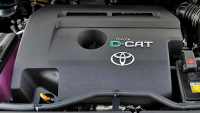
Basic parameters 2.2 AD FHV:
Number of cylinders - 4; type - in-line.
Displacement: 2,231 cm3.
Piston: diameter - 86 mm; stroke - 96 mm.
Torque Rating: 380 to 400 Nm.
Maximum power output: 170 to 177 bhp.
Cylinder compression ratio: 15.7.
Fuel equipment: Common Rail (Denso).
The pressure of the fuel injection system: not less than 2000 bars.
Average fuel consumption of crossover RAV4, equipped with this engine with manual transmission, is:
when driving in city mode - 7.4 l/100 km;
on a country highway - 4,9 l/100 km;
in the combined cycle - 5,9 l/100 km.
One of the main advantages of this power unit is its high fuel efficiency. Other advantages of the 2.2 AD FHV:
high torque at low revs;
high reliability of timing chain drive;
availability of hydro-compensated valves.
The disadvantages of turbodiesels are high oil consumption, frequent failure of EGR valve because of sedimentation and contamination. In addition, experts note the extremely low service life of the particulate filter.
Maintenance, recommended oils and refuelling quantities
Scheduled routine maintenance on all three diesel engines is carried out at intervals of 10 thousand km, but no less than once every 12 months. At the same time, engine oil (recommended TOYOTA 5W30 5L Original) and filter elements should be changed:
oil - at every service;
air - after 20 thousand km;
fuel - every service interval; air - every 20,000 km; fuel - every 30,000 km.
The required oil volume varies from 5.4 to 6.5 litres depending on the engine model.
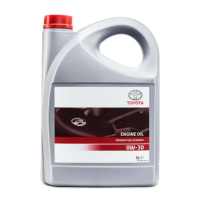
The cooling system is serviced every 80,000 km with antifreeze change. Super Long Life G12 is used, filling volume: 8.7 to 10.6 l.
Conclusion
The diesel engines used in the second and fourth generation Toyota RAV4 crossovers are economical and reliable. With regular and quality maintenance, the life of the power unit of any of the three models is not less than 250 thousand km. When performing routine maintenance it is necessary to use recommended technical fluids and original accessories.
And don't forget to subscribe to our Telegram Channel for news




